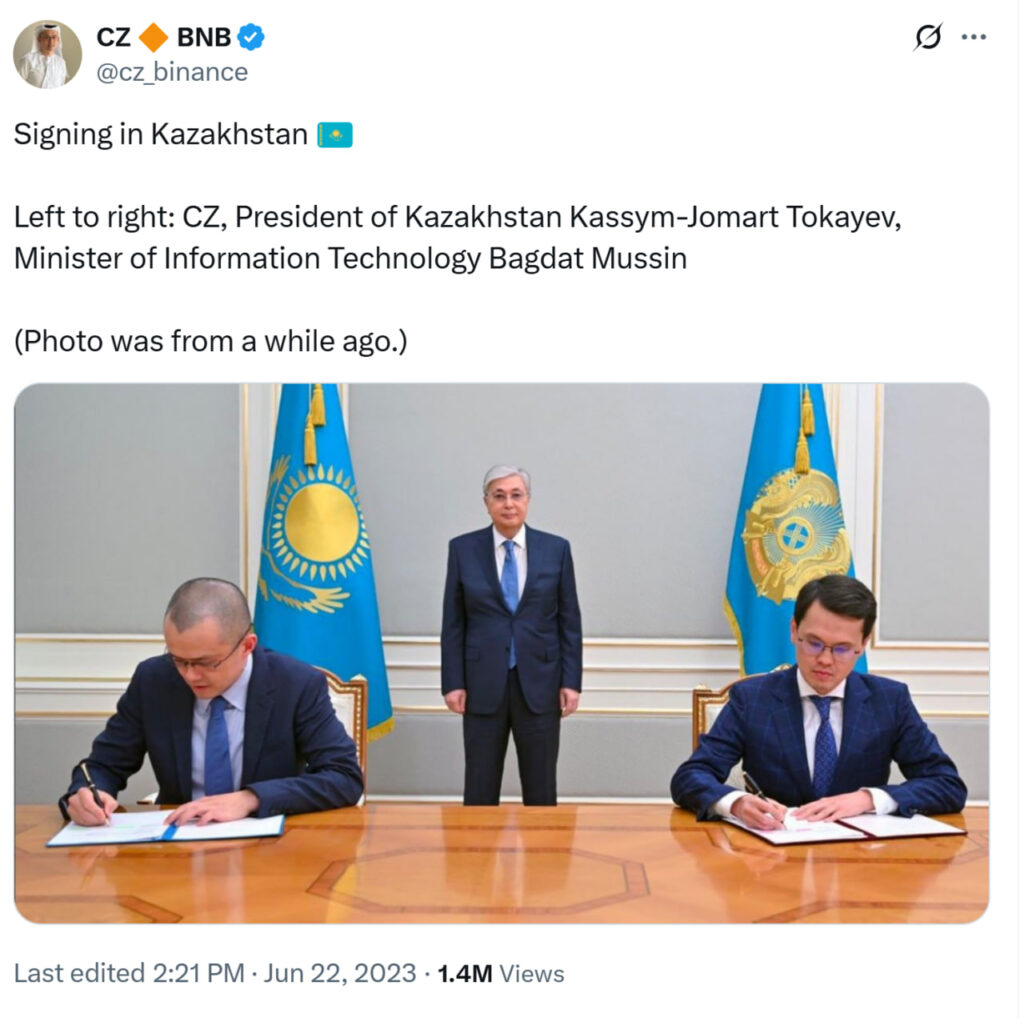Kazakhstan is poised to emerge as a significant player in the cryptocurrency arena within Central Asia, according to Kanysh Tuleushin, the nation’s first vice minister of digital development, innovation, and aerospace industry. In a compelling op-ed published in the Kazakhstanskaya Pravda, Tuleushin highlighted that easing regulatory restrictions could catalyze the country’s aspirations to become a regional crypto hub. He expressed optimism that lifting barriers on digital asset trading could yield substantial economic benefits, potentially adding hundreds of billions of tenge to Kazakhstan’s national budget.
“If all restrictions were lifted and digital asset trading was allowed across Kazakhstan, the impact could be significant,” Tuleushin stated, further emphasizing that “Kazakhstan might become Central Asia’s crypto hub.”
A significant aspect of Kazakhstan’s strategy involves attracting foreign investment in the booming crypto mining sector. Tuleushin explained that crypto mining could not only modernize the nation’s energy infrastructure but also contribute to stability in the power grid by efficiently utilizing excess energy. This aligns with the country’s 70/30 energy initiative, which allows foreign investors to fund thermal power upgrades while selectively supplying energy to miners.
Supporting this growth, the Kazakhstan government has recorded substantial contributions from the crypto mining sector, totaling $34.6 million in taxes over the last three years. As of 2023, the nation boasts 415,000 registered mining machines and a growing trading landscape with the Astana International Financial Centre (AIFC), where trading volumes increased dramatically from $324 million to an impressive $1.4 billion between 2023 and 2024.
However, challenges remain, as an estimated $4.1 billion in crypto transactions took place outside of official oversight in 2023, with authorities responding by shutting down illegal exchanges and disrupting fraudulent activities.
In addition to its focus on mining, Kazakhstan is actively developing its own central bank digital currency, the digital tenge, set to launch in 2025, aiming to create a more regulated financial ecosystem. This initiative comes amid a regional trend, with neighboring countries like Uzbekistan and Kyrgyzstan also exploring crypto-friendly policies, highlighted by Binance’s recent partnership with Kyrgyzstan’s National Agency for Investments.
Kazakhstan’s Potential as a Central Asia Crypto Hub
Kazakhstan is on the verge of becoming a major player in the cryptocurrency market in Central Asia. Here are the key points regarding its potential impact:
- Regulatory Easing
- First Vice Minister Kanysh Tuleushin advocates for lifting restrictions on digital assets.
- Potential legalization and taxation could significantly enhance the national budget.
- Calls for clear crypto regulations, transparent exchanges, and legal crypto ATMs.
- Emergence of Crypto Mining
- Crypto mining could modernize Kazakhstan’s energy infrastructure.
- Foreign investors involved in the 70/30 energy initiative can balance the power grid.
- Using associated petroleum gas for data centers can reduce emissions and generate revenue.
- Financial Contributions
- Kazakhstan’s crypto mining sector has earned $34.6 million in taxes over three years.
- 415,000 mining machines registered as of 2023, indicating significant industry growth.
- Trading on AIFC has surged from $324 million in 2023 to $1.4 billion in 2024.
- Challenges with Regulation
- Despite advancements, $4.1 billion in crypto transactions remain unregulated outside the AIFC.
- Authorities are cracking down on illegal exchanges, indicating a need for better oversight.
- The development of the digital tenge aims to facilitate regulated trading.
- Regional Collaboration
- Other Central Asian nations like Uzbekistan and Kyrgyzstan are also fostering friendly environments for crypto.
- Binance is collaborating with Kyrgyzstan to enhance blockchain education and crypto infrastructure.
“If all restrictions were lifted and digital asset trading was allowed across Kazakhstan, the impact could be significant.” – Kanysh Tuleushin
The changes in Kazakhstan’s crypto landscape could potentially influence individual investors and businesses by opening new avenues for investments and trading, boosting the economy, and promoting technological advancements.
Kazakhstan’s Ambitious Bid to Lead Central Asia in Crypto: A Comparative Perspective
Kazakhstan is keenly positioning itself to become the preeminent crypto hub in Central Asia, bolstered by a vision outlined by Kanysh Tuleushin, the first vice minister of digital development, innovation, and aerospace industry. With regulatory ease and smart policies, it aims to attract crypto miners and digital asset traders, capitalizing on its energy resources. This pursuit, however, invites scrutiny and comparison with neighboring countries like Uzbekistan and Kyrgyzstan, which are also stepping into the crypto landscape.
Competitive Advantages: The potential legalization of digital assets in Kazakhstan could unleash a torrent of investment opportunities, similar to what has been observed in developing crypto markets worldwide. The government’s proactive stance, particularly the recent MOU with Binance, signals an openness to foreign partnerships that can modernize its infrastructure. Moreover, the strategic plan to utilize surplus energy for crypto mining aligns with global sustainability trends, which could make the country a darling for eco-conscious investors looking to explore crypto ventures with a lower carbon footprint.
In contrast, Kazakhstan’s considerable success in generating tax revenue from its burgeoning mining sector—$34.6 million in the past three years—illustrates the potential financial windfalls from a well-regulated crypto environment. If implemented effectively, potential tax revenues could be in the hundreds of billions of tenge, enhancing the national budget and stimulating socio-economic growth.
Disadvantages and Challenges: Despite its ambitious vision, Kazakhstan faces significant hurdles, particularly in regulating its vast unmonitored crypto market, which saw a staggering $4.1 billion in transactions outside government oversight in 2023. While efforts have been made to crack down on illegal exchanges, the presence of unregulated trading platforms raises concerns about the security and legitimacy of investments in the country. This contrasts starkly with the more regulated approaches observed in Uzbekistan and Kyrgyzstan, which are making strides in integrating blockchain technology while maintaining stricter governance.
While Kazakhstan’s initiatives could present exciting opportunities for foreign investors and crypto enthusiasts, they could also create confusion and skepticism for local traders and businesses that may fear an unpredictable regulatory landscape. Investors simulating the waves of other successful crypto nations might find themselves in unfamiliar waters if Kazakhstan does not navigate its regulations carefully.
As Kazakhstan embarks on this ambitious path, its growth could significantly benefit energy-focused crypto firms and mining operations looking to capitalize on its resources and policies. However, this rapid evolution could simultaneously intimidate smaller, less-disciplined players in the ecosystem, leaving them vulnerable to the uncertainties tied to governmental regulatory changes. Balancing proactive innovation with robust regulatory frameworks will be key to Kazakhstan thriving in the competitive crypto space.















